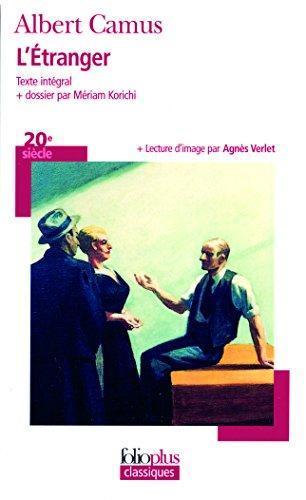Julia_98@bookwyrm.world reviewed The Stranger by Albert Camus
A Sunburned Soul: Confronting Absurdity in Camus’ The Stranger
5 stars
Reading The Stranger by Albert Camus left me both unsettled and oddly calm — like staring into a bright, empty sky and realizing it has no answers. Originally published in 1942, this novel is often seen as the embodiment of Camus’ philosophy of the absurd, and with good reason.
The story follows Meursault, a French-Algerian clerk who reacts to life’s most significant events — his mother’s death, a romantic relationship, even a murder — with unsettling emotional detachment. His indifference is not cruelty, but a radical honesty: he simply refuses to pretend that life has inherent meaning.
When Meursault shoots an unnamed Arab man under the blazing Algerian sun, it feels less like a crime of passion than an existential rupture. What follows is not just a murder trial, but a trial of Meursault’s character, his lack of faith, his refusal to lie about grief or belief. Society, it seems, …
Reading The Stranger by Albert Camus left me both unsettled and oddly calm — like staring into a bright, empty sky and realizing it has no answers. Originally published in 1942, this novel is often seen as the embodiment of Camus’ philosophy of the absurd, and with good reason.
The story follows Meursault, a French-Algerian clerk who reacts to life’s most significant events — his mother’s death, a romantic relationship, even a murder — with unsettling emotional detachment. His indifference is not cruelty, but a radical honesty: he simply refuses to pretend that life has inherent meaning.
When Meursault shoots an unnamed Arab man under the blazing Algerian sun, it feels less like a crime of passion than an existential rupture. What follows is not just a murder trial, but a trial of Meursault’s character, his lack of faith, his refusal to lie about grief or belief. Society, it seems, is more disturbed by his honesty than his violence.
What struck me most was the clarity of Camus’ prose. The sentences are clean and sharp, mirroring Meursault’s view of the world: unembellished, immediate, free of illusion. It’s a language that leaves no room to hide — from death, from truth, or from ourselves.
For me, The Stranger is less about a man on trial than about what it means to live authentically in an indifferent universe. It’s not comforting, but it is liberating.


